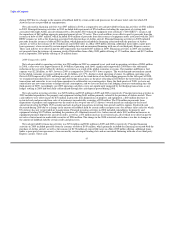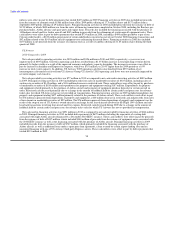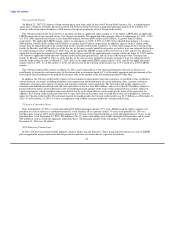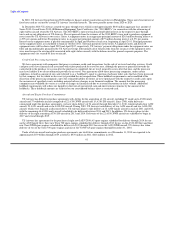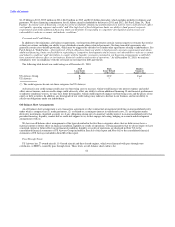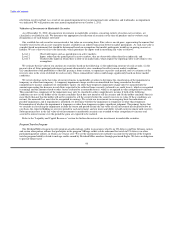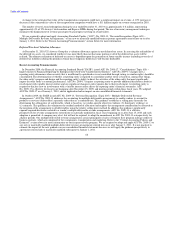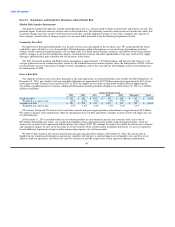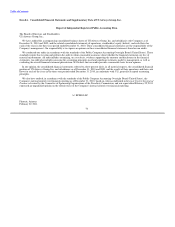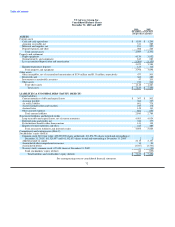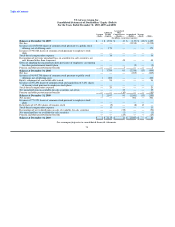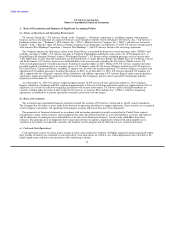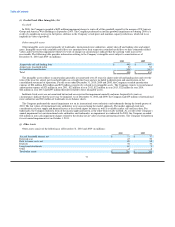US Airways 2010 Annual Report Download - page 68
Download and view the complete annual report
Please find page 68 of the 2010 US Airways annual report below. You can navigate through the pages in the report by either clicking on the pages listed below, or by using the keyword search tool below to find specific information within the annual report.
Table of Contents
when these mileage credits are redeemed and therefore have recognized an expense and recorded a liability for mileage credits
outstanding.
The liability for outstanding mileage credits earned by Dividend Miles members through the purchase of travel includes all mileage
credits that are expected to be redeemed, including mileage credits earned by members whose mileage account balances have not yet
reached the minimum mileage credit level required to redeem an award. Additionally, outstanding mileage credits are subject to
expiration if unused. In calculating the liability, we estimate how many mileage credits will never be redeemed for travel and exclude
those mileage credits from the estimate of the liability. Estimates are also made for the number of miles that will be used per award
redemption and the number of travel awards that will be redeemed on partner airlines. These estimates are based on historical program
experience as well as consideration of enacted program changes, as applicable. Changes in the liability resulting from members earning
additional mileage credits or changes in estimates are recorded in the statement of operations.
The liability for outstanding mileage credits is valued based on the estimated incremental cost of carrying one additional passenger.
Incremental cost includes unit costs incurred for fuel, credit card fees, insurance, denied boarding compensation, food and beverages as
well as fees incurred when travel awards are redeemed on partner airlines. In addition, we also include in the determination of
incremental cost the amount of certain fees related to redemptions expected to be collected from Dividend Miles members. These
redemption fees reduce incremental cost. No profit or overhead margin is included in the accrual of incremental cost.
As of December 31, 2010 and 2009, the incremental cost liability for outstanding mileage credits expected to be redeemed for future
travel awards accrued on the balance sheets within other accrued expenses was $149 million, representing 132.4 billion mileage credits,
and $130 million, representing 129.1 billion mileage credits, respectively.
A change to certain estimates in the calculation of incremental cost could have a material impact on the liability. At December 31,
2010, we have assumed 10% of future travel award redemptions will be on partner airlines. A 1% increase or decrease in the percentage
of travel awards redeemed on partner airlines would have a $9 million impact on the liability as of December 31, 2010.
We also sell frequent flyer program mileage credits to participating airline partners and non-airline business partners. Sales of mileage
credits to business partners is comprised of two components, transportation and marketing. We use the residual method of accounting to
determine the values of each component. The transportation component represents the fair value of future travel awards and is determined
based on the equivalent value of purchased tickets that have similar restrictions as frequent traveler awards. The determination of the
transportation component requires estimates and assumptions that require management judgment. Significant estimates and assumptions
include:
• the number of awards expected to be redeemed on US Airways;
• the number of awards expected to be redeemed on partner airlines;
• the class of service for which the award is expected to be redeemed; and
• the geographic region of travel for which the award is expected to be redeemed.
These estimates and assumptions are based on historical program experience. The transportation component is deferred and amortized
into passenger revenue on a straight-line basis over the period in which the mileage credits are expected to be redeemed for travel, which
is currently estimated to be 33 months.
Under the residual method, the total mileage sale proceeds less the transportation component is the marketing component. The
marketing component represents services provided by us to our business partners and relates primarily to the use of our logo and
trademarks along with access to our list of Dividend Miles members. The marketing services are provided periodically, but no less than
monthly. Accordingly, the marketing component is considered earned and recognized in other revenues in the period of the mileage sale.
As of December 31, 2010 and 2009, we had $178 million and $212 million, respectively, in deferred revenue from the sale of mileage
credits included in other accrued expenses on the consolidated balance sheets. For the years ended December 31, 2010, 2009 and 2008,
the marketing component of mileage sales recognized at the time of sale in other revenues was approximately $144 million, $112 million
and $126 million, respectively.
67


